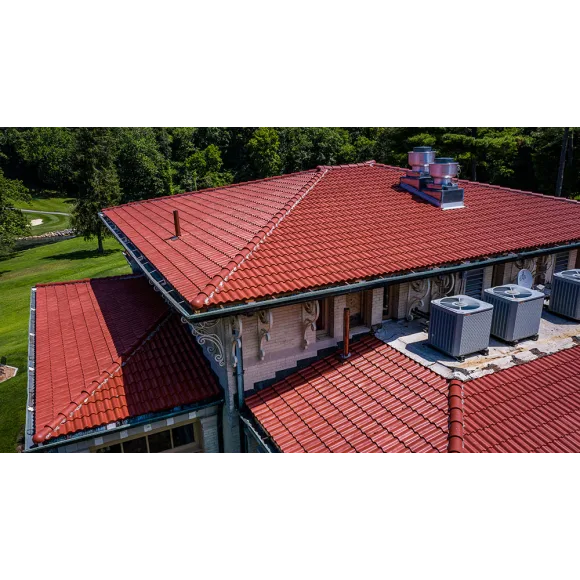Roof Replacement in Pennsylvania requires careful consideration of materials, climate conditions, and local building codes. Whether you’re in Philadelphia, Pittsburgh, or anywhere in between, understanding the pros and cons of different roofing materials like synthetic slate, standing seam metal, and asphalt shingles is essential for making an informed decision.
Assessing Your Roofing Needs:
Before diving into the specifics of materials, assess your roofing needs. Consider factors such as budget, durability, aesthetics, and maintenance requirements. Additionally, consult with local roofing contractors familiar with Pennsylvania’s climate and building regulations to ensure compliance and optimal performance.
Synthetic Slate Roof Replacement in Pennsylvania:

Pros:
- Aesthetic Appeal: Synthetic slate roofs mimic the appearance of natural slate, offering a sophisticated and timeless look.
- Durability: Synthetic slate roofs are highly durable and resistant to cracking, chipping, and fading.
- Low Maintenance: Synthetic slate requires minimal maintenance and is resistant to mold, mildew, and pests.
- Lightweight: Synthetic slate is lighter than natural slate, reducing the structural load on the roof.
Cons:
- Cost: Synthetic slate roofing materials are the most expensive option, potentially making them cost-prohibitive for some homeowners.
- Installation Complexity: Synthetic slate installation requires specialized techniques and skilled labor, increasing installation costs.
- Limited Availability: Synthetic slate may be less readily available compared to other roofing materials, potentially leading to longer lead times for installation.
Standing Seam Metal Roof Replacement in Pennsylvania:

Pros:
- Durability: Standing seam metal roofs are highly durable and can withstand harsh weather conditions, including heavy snowfall and high winds.
- Longevity: Metal roofs have a longer lifespan compared to other materials, lasting up to 50 years or more with proper maintenance.
- Energy Efficiency: Metal roofs reflect sunlight, reducing heat absorption and energy costs during hot summers.
- Low Maintenance: Metal roofs require minimal maintenance and are resistant to mold, mildew, and pests.
Cons:
- Initial Cost: Standing seam metal roofing materials and installation tend to be more expensive upfront compared to asphalt shingles.
- Noise: Without proper insulation, metal roofs can amplify sound during heavy rain or hailstorms, potentially causing noise disturbances.
- Denting: While metal roofs are durable, they can dent from hail or falling debris, impacting their appearance over time.
A Word of Caution: Exposed Fastener roofs are not of standing seam roofs!

Exposed fastener metal roofs, while cost-effective, present potential drawbacks. Over time, the exposed fasteners may become points of vulnerability, susceptible to corrosion and leaks. The reliance on exposed fasteners compromises the roof’s integrity, especially in regions with heavy rainfall, snow, or high winds, such as Pennsylvania. Additionally, exposed fastener roofs may require more frequent maintenance to address potential issues, adding to the overall cost of ownership.
In contrast, an asphalt roof offers a compelling alternative, especially in regions like Pennsylvania. Asphalt shingles provide a durable and reliable roofing solution, capable of withstanding diverse weather conditions while offering ease of installation and minimal maintenance requirements. While exposed fastener metal roofs may seem appealing initially, the long-term benefits of an asphalt roof, including longevity and peace of mind, outweigh the short-term cost savings.
Asphalt Shingle Roofing:

Pros:
- Affordability: Asphalt shingles are the most cost-effective option, making them a popular choice for budget-conscious homeowners.
- Variety: Asphalt shingles come in a wide range of colors and styles, allowing for customization to match your home’s aesthetic.
- Ease of Installation: Asphalt shingles are lightweight and easy to install, reducing labor costs and installation time.
- Repairability: Damaged shingles can be easily replaced, extending the lifespan of the roof.
Cons:
- Limited Lifespan: Asphalt shingle roofs typically last 20 to 30 years, shorter than metal or synthetic slate roofs.
- Susceptibility to Weather Damage: Asphalt shingles may deteriorate over time due to exposure to UV radiation, temperature fluctuations, and severe weather conditions.
- Environmental Impact: Asphalt shingles contribute to landfill waste when replaced, as they are not easily recyclable.
Conclusion:
When replacing a roof in Pennsylvania, weigh the pros and cons of synthetic slate, standing seam metal, and asphalt shingle roofing materials against your budget, aesthetic preferences, and performance expectations. Consider consulting with local roofing professionals to assess your specific needs and determine the most suitable roofing solution for your home. By making an informed decision, you can ensure a durable, long-lasting roof that enhances the beauty and value of your Pennsylvania property for years to come.
SBS-Exteriors.com 724.918.1000

One response to “A Guide to Roof Replacement in Pennsylvania: Pros and Cons of Synthetic Slate, Standing Seam Metal, and Asphalt Shingle Roofs”
[…] A Guide to Roof Replacement in Pennsylvania: Pros and Cons of Synthetic Slate, Standing Seam Metal, … […]